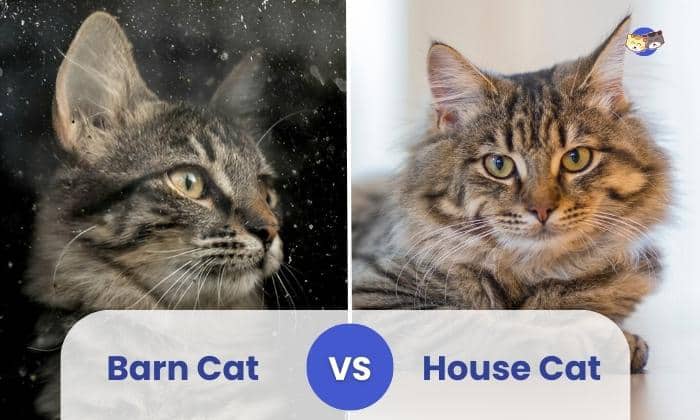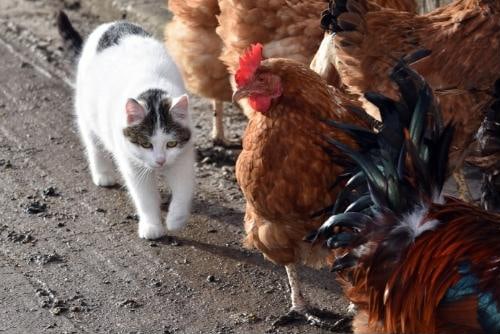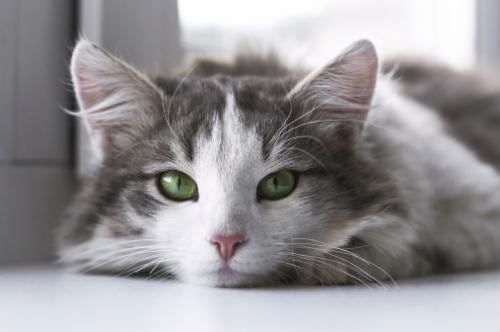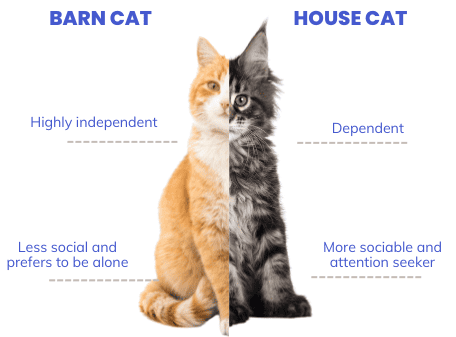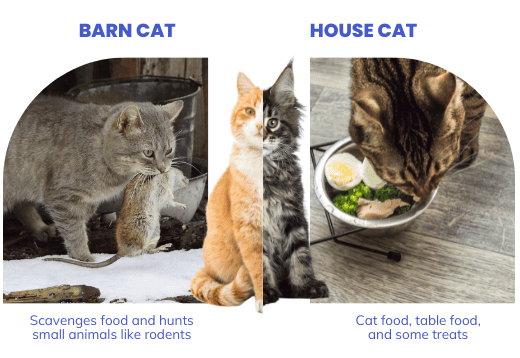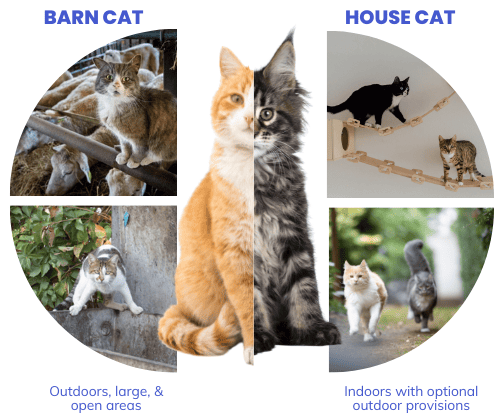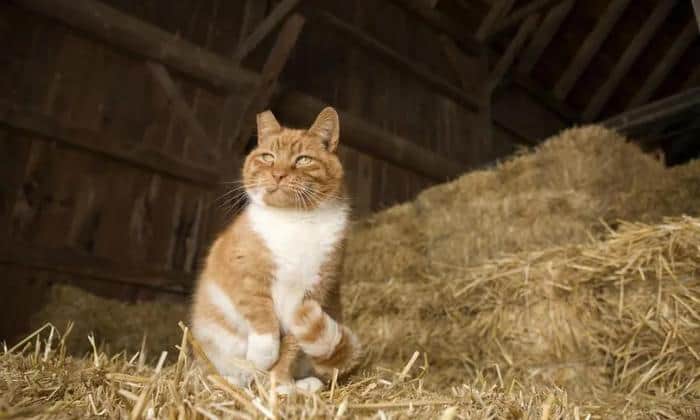This article will help you understand the distinction between a barn cat vs house cat, including their character, proper care, and possible challenges you might encounter in having these types.
Due to their different lifestyle and environment, barn cats and house cats vary drastically in terms of dependency, sociability, and preferred diet. Look at the comparison below to see how to tell these two types apart.
|
Key Features |
Barn Cat |
House Cat |
| Dependency | Highly independent | Dependent |
| Sociability | Less social and prefers to be alone. | More sociable and attention seeker. |
| Diet | Scavenges food and hunts small animals like rodents. | Cat food, table food, and some treats. |
| Environment | Outdoors, large, and open areas. | Indoors with optional outdoor provisions. |
| Health | More likely to contract diseases | More likely to get obese |
Table of Contents
Overview
1. Barn Cat
A barn cat, meaning a farm cat, is often found in agricultural or rural areas. Barn cats are low maintenance, self-sufficient, solitary, and can feed themselves by scavenging or hunting.
One benefit of having a feral barn cat is their contribution to natural pest control. It has the innate ability to prey and crack down on rodents, insects, birds, and even snakes. This is also why they are often adopted as farm cats.
However, because of their strong characteristics, it can be challenging to:
- Build a relationship with them.
- Have other pets or animals. For example, they might not jive well with chickens, birds, and hamsters.
- Keep them from contracting/spreading disease.
2. House Cat
A house cat is a domestic type often acquired as a pet or human companion. It typically lives indoors with its owner and could have minimal exposure to the outdoors. An indoor cat depends on its owner for food; it may have poor hunting skills and is not that agile.
House cats are mostly beneficial for overall health. Keeping one around can lower the risks of heart attack, as they can reduce stress and anxiety. Aside from that, they could be a good company.
Some of the greatest challenges in having a house cat are:
- The required maintenance cleaning.
- Dealing with falling hair.
- Keeping your furniture free from scratches caused by their sharp claws.
Is My Cat a Barn Cat or a Domestic Cat?
1. Personality and Traits
- Dependency
Barn cats are self-sufficient and can survive on their own. One notable barn cat behavior is their natural hunting instinct, so they can effortlessly catch small animals.
In contrast, a house cat is needy and highly dependent on their caretaker. While they also have the instinct to stalk and catch prey, they’re not that efficient at hunting and usually depend on their human for food.
- Sociability
Barn cats tend to be anti-social and aloof with humans. They’re not cuddly and tend to be indifferent toward other pets. Meanwhile, most house cats love human affection/interaction and can get on well with other felines and dogs.
2. Diet
Although barn cats can hunt for prey independently, giving them high-protein food is still recommended, especially if there aren’t enough small prey around. That said, they’re not picky about their diet.
Feeding domestic cats can be more pricey, considering how they mostly prefer fancy feasts. In other words, you can’t expect them to gulp down a dead mouse or rodent.
3. Living Environment
Barn cats primarily live outdoors in the countryside and the suburbs. Occasionally, you can spot them scavenging food on dumpsters and around the sidewalks. They’re not contented being bound indoors, preferring to wander outside near areas with plenty of food.
House cats live indoors within the household. As such, captivity won’t stress them like their barn counterparts. While they may also wander outside, it’s unlikely they’ll stray anywhere far.
4. Health and Care
Both types should take regular trips to the vet for vaccination, getting spayed or neutered, and grooming.
Barn cats are more low-maintenance, but since they love to wander around, keeping them safe from accidents and contracting/spreading disease can be hard.
As for domestic cats, since they mostly stay indoors, they’re at a much lower risk of contracting diseases or parasites. However, given that they don’t have to work for food and are less active, they’re more likely to get obese.
Can a Barn Kitten Become a House Cat?
With proper care and guidance, you can gradually turn barn kitties into house cats. If exposed to humans early on, they would more likely adapt to become house cats as they mature.
Most professionals would recommend giving the cat the time to adjust to the new environment for about a month before settling at home for good.
However, the “cold turkey” method can prove to be more effective if done right. With this approach, you’ll need to take a barn kitten inside right away. Here are some tips for this tactic:
- When using this method, you have to be very firm, refraining from any urge to allow your cat outside.
- Make the barn felines feel safe, provide everything they need, and keep them entertained behind closed doors so they won’t become stressed.
- Try positive reinforc Every time the cat stops begging at the door, reward it with a treat.
If you stick to the tips above, you should be able to successfully transition a barn kitten into an indoor cat after a month or two.
Tips for determining which type of cat suits your needs
- Consider your current environment. If you live in the city in a small apartment, a house cat would be more suited, while barn cats are good for larger properties with plenty of wildlife and roaming space.
- Evaluate how much time and effort you can afford. Barn cats can be challenging to tame at first. However, they require lower maintenance and attention than house cats.
- Be clear with your purpose and lifestyle. Are you looking for an affectionate pet for companionship? A house cat would be best. And if you intend to have them for pest control, a barn cat would be perfect for the job.
Conclusion
Classifying a barn cat vs house cat could be done by closely observing the feline’s behavior, how it interacts with humans, and its lifestyle.
Moreover, in choosing the type of cat, you have to see both from different angles and match that with your requirements. It’s also important to take into account things like your current environment, how much time you can spare for them, and your main purpose for getting one.

I pursued veterinary studies at the University of Kansas. After several years of practice, I established a veterinary clinic in Kansas. When Michael extended an invitation with a vision that went beyond emergency support – sharing of caregiving information for guardians to create the best living environment for cats, I didn’t hesitate to join the organization.
My role here involves verifying the information presented on the official website. With my experience, I believe the information provided is entirely accurate. If you have any concerns, please feel free to reach out to me


